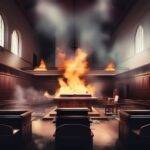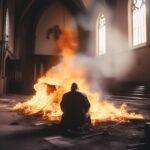In the recent development of the arson case involving two historic churches in Douglas, the defendant, Eric Ridenour, expressed his readiness for trial. However, his mental competence for trial is still pending a formal ruling, raising intricate questions about the impact of his religious beliefs on his ability to stand trial.
Religious Motivations Behind Church Arson
The Tucson Federal Courthouse has been a venue where the religious beliefs of Eric Ridenour have played a crucial role in the proceedings. Prosecutors allege that Ridenour set fire to the two churches because he believed it went against God’s law for one church to have a female pastor and the other a gay pastor. The charges against him include arson and hate crimes.
Unusual Legal Dynamics
Adding an unusual twist to the legal dynamics, Ridenour has chosen to serve as his own attorney, with a professional lawyer advising him. This decision adds complexity to the case, as it intertwines legal strategy with the defendant’s personal convictions.
Psychological Evaluation Raises Concerns
A recent psychological evaluation introduced a new dimension to the case. While the evaluating doctor concluded that Ridenour understands his situation and is competent to stand trial, a comment made by the doctor created a potential conflict. The doctor expressed concern that Ridenour’s claims of communicating with God might be perceived as grandiose and delusional, raising doubts about his overall competence for trial.
Legal Proceedings and Judge’s Intervention
In response to the conflicting aspects of the psychological evaluation, the prosecutor convinced Federal Judge Scott Rash to order a new hearing with the doctor. The purpose of this hearing is to seek clarification on the doctor’s comments before making a formal ruling on Ridenour’s competence. The resolution of this matter is anticipated towards the end of the month, further prolonging the legal proceedings.
Conclusion: Navigating the Intersection of Faith and Legal Competence
As the case unfolds, the intersection of religious beliefs and legal competence becomes a focal point. The unique circumstances, including Ridenour’s chosen legal representation and the evaluation’s complexities, add layers of complexity to an already sensitive case. The forthcoming ruling on Ridenour’s competence will likely shape the trajectory of the trial and shed light on the delicate balance between faith and legal proceedings.








Leave a Reply